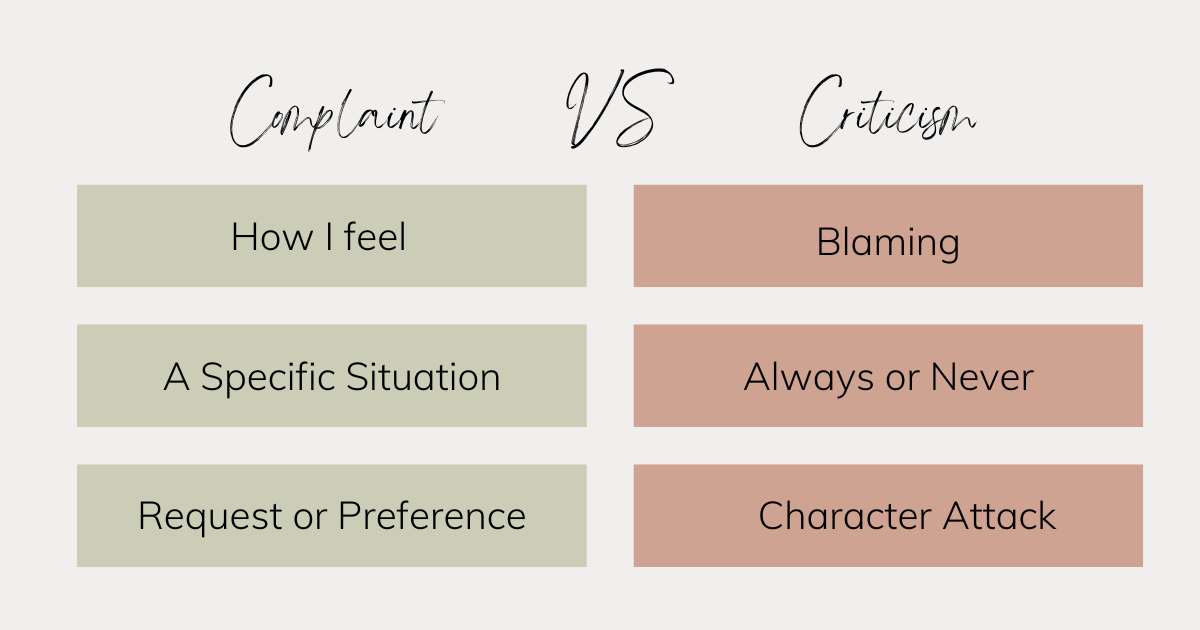4 Communication Rules All Healthy Relationships Need.
Divorce can be predicted with 91% accuracy (Gottman, 2015).
Kinda crazy right? Psychologist and relationship researcher extraordinaire, Dr. John Gottman, and his crew have spent decades researching what makes relationships successful, and what makes them fail.
One of the predictors they landed on is called “the four horsemen”
The four horsesmen are four negative ways of interacting that erode the relationship over time. Definitely something to be aware of!
After reading this post you’ll be able to
Identify the 4 horsemen tendencies in action
Pivot and try the alternative healthier version
Feel more empowered in the health of your relationship
The Four Horsemen
1.) Criticism
A global attack on your partner’s overall character.
Keep in mind, this differs from complaints. We’re most definitely going to have complaints about our partners. But whereas complaints are specific, focused on how the complainer feels, and asking for a specific request or preference, criticism is more of an attack on who your partner is.
Example of a criticism: “What is WRONG with you?”, “You’re such a forgetful person!” or “you ALWAYS (or never) do this!”
Example of a complaint: “I felt bummed when you watched the survivor finale without me, next time can you wait til we can watch it together”
The Alternative: Complaints
Instead of criticisms, try complaints. We need to speak up when we feel wronged or hurt by our partners, the important part is how we bring it up.
Make sure your complaint is focused on
1.) how YOU (the complainer) feels
2.)that you’re referencing a specific situation, and
3.) that you’re making a concrete request or preference as to how you want your partner to behave differently next time.
2.) Contempt
Disgust & disrespect towards your partner. Looking down on them.
This is one you especially want to avoid. When your partner picks up on your disdain towards them, the walls come up and it makes it VERY challenging to resolve arguments.
Maybe that seems extreme, but I want you to be mindful of what can get someone to the place of contempt; a steady stream of dwelling on negative thoughts about or towards your partner.
A negative thought here and there is normal, but if this is where your mind rests often, contempt can grow.
Avoid these forms of contempt:
sarcasm
mean humor
eye-rolling
insults
belittling comments
The Alternative: Nurture Fondness & Admiration
Instead of tallying and keeping score on all of the things you dislike about your partner, try keeping track of what you do like and appreciate. This can be simple, but it goes a long way.
Try keeping a notes section in your phone and regularly noting the things you love about your partner. When you notice you’re unfairly dwelling on the negatives about your partner, go to the list to remind yourself what you love about them.
3.) Defensiveness
An anxious focus on Defending yourself and avoiding complaints
Look, defensiveness makes so much sense to me as a reaction. Especially when someone is coming at you with a criticism or a complaint that feels unfair.
But, it’s just not worth it. Not only does it not help, but it escalates the conflict.
If you think about it, when we get defensive, we’re essentially displacing the blame we felt back onto our partners. And that just keeps the cycle of conflict going, which is not what we want.
So what the heck are you supposed to do when a criticism comes your way, and every part of you just wants to rigorously prove why you are SO not in the wrong??!?
The Alternative: Reflective Listening + Apologize When It’s Warranted
Try your darndest to hear what your partner is trying to say
Remember that this will likely de-escalate things, so it’s worth it
If there’s something you need to apologize for, apologize
When things are calmer, make an effective complaint (check back to the criticism section on how to do this)
4.) Stonewalling
Tuning out, Shutting Down.
Stonewalling is when one person kinda zones out of the relationship. This could show up a few different ways;
Barely engaging in the convo (looking away, not responding)
Leaving the conversation without a kind explanation, mid convo.
Acting like you don’t care about what your partner is saying.
This horsemen usually shows up later in relationships, after things have not been going great for a while. Usually it’s the culmination of growing resentments and disconnection that stemmed from the first three horsemen.
The Alternative: Mindfully Take a Break
The stonewaller is usually shutting down because they feel overwhelmed and feel like they can’t handle the conflict that’s coming up.
It’s ok to need a break in the middle of conflict, maybe you know yourself well, and you know that you’re not gonna be able to show up in the conversation in a loving way right this minute. Totally a-ok and understandable.
What’s not ok is to just check out with no communication. So instead, try having a go to way of telling your partner that you need a break to self regulate and calm yourself.
Something like, “Hey, I love you, but I notice I’m starting to shut down. Can we pick this back up in a bit?”
That way, you’re partner doesn’t feel abandoned, and you’re taking care of your needs as well. Make sure the break time is spent calming yourself!
Don’t Worry, You’ve Got This!
If you see yourself in any of the 4 horsemen, rest assured, you are not alone. It’s ok. Most of us do some of these things some of the time.
The cool thing is, now that you’re aware of what to avoid, and what to try instead, you can feel empowered in keeping your relationship healthy and happy!
Take some time to share this article with your partner. Maybe you can each reflect on areas of strength and opportunities to grow. Or go ahead and set an intention to focus on a challenge area that you want to practice improving.
I made this into cheat sheet to help you have a quick reference guide. Click below to download!
Hi! I’m Ellie, a private practice therapist offering online therapy to empathetic women & couples in Maryland, DC and Virginia. I help women manage anxiety & stress and couples strengthen their relationships.
Check out my website to grab your anxiety relief freebie. If you live in Maryland, DC, or Virginia, reach out to see if we’re a good fit for therapy.









